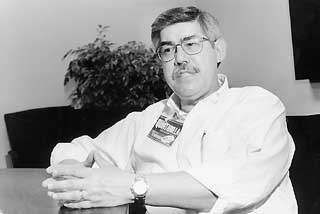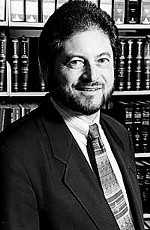Down to Two
Runoff Candidates Offer Views on Austin's Future
By Kevin Fullerton, Fri., June 2, 2000

For a City Council race that promises to be as tight as does the June 3 runoff for Place 2, the conduct of the opposing candidates has been surprisingly quiet and dignified. That's partly because both candidates -- Raul Alvarez, Sierra Club environmental justice director and planning scholar, and Rafael Quintanilla, consultant/attorney and former city planning commissioner -- are well-liked, respected, and would rather talk about the future of Austin than throw darts at their opponent. But in part, it's also true that the genteel nature of the race is due to the homogeneity of opinions expressed by the two. With Austin's economic health assured for the near future, the progressive agenda -- calling for a better-planned, better-paid city, not just a bigger one -- has become a common campaign platform. A lot has already been said about the backgrounds of Alvarez and Quintanilla -- how Alvarez has risen through grassroots circles while Quintanilla is more connected to the business community and the traditional power elite. Questions have been raised as to which man is more likely to stick to the bedrock principles of the Green movement in this era of compromises. Alvarez' camp says that the young, Eastside neighborhood leader has the education and on-the-ground experience to lead on the sustainable growth front. Quintanilla, however, whose past includes advocating for public health spending as well as for city contracts, counters that his age and wisdom give him more grace under fire. But outside sparsely attended candidate forums, not much has been heard from the candidates' own lips. Below, Quintanilla and Alvarez speak for themselves, in separate interviews, on topics that bring out some of their philosophical differences: roads, downtown development, and neighborhood planning.
As a final election note, Alvarez says that if elected, he will work full time as a City Council member; Quintanilla says he hopes to continue his work as an outside adjudicator for the Texas Education Agency while he serves on the council.
On Roads
Austin Chronicle: What more should the public know about the proposed SH 130 bypass, and should the city protest a route west of Lake Walter E. Long, even if it delays the project?Rafael Quintanilla: Clearly, one of the main questions is, how is it going to be paid for? As I understand it, there is a possibility that it will be a toll road as opposed to a federally funded highway. ... We need to know what the impact would be on any historical landmarks, or any communities along the way, so all those impact studies need to be completed. We need to know better what the alignment is likely to be. ... As to whether I would protest it at the expense of delaying it -- only if I felt that there was a real serious environmental reason for doing so. At this point, I haven't heard of such a reason. I think that this highway is important enough, that we need it to the point that we shouldn't delay it. I don't want to be part of killing it by delay.
AC: Would a western route constitute grounds for you to delay the project?
RQ: Maybe they would come across a sinkhole or something that is a real serious environmental impact. But if there isn't anything like that, then I would not delay it.
AC: What other roadway expansions would you support?
RQ: I'm familiar with arguments for extending MoPac north out to I-35, and I would support that, and I know that there are other ongoing discussions concerning other roads, but I'm not up to speed on them enough to tell you yes to this one or no. I know that we need some overpasses, for example, on Ed Bluestein Boulevard, so that people don't have to stop for traffic lights. Those improvements, to me, are the most obvious, and we ought to move on those right away while we continue to discuss whatever is further down on the list.
AC: What about roadway expansions south and west of the city?
RQ: I think those need a lot more discussion before I'm going to be comfortable with them. I have stated several times that I'm going to do what I can to protect the aquifer, and so I will have to be much better informed than I am at this point before I tell you I'm supporting something southwest.
Raul Alvarez: There's a lot of public support for building SH 130, [but] if we do build it, we need to put whatever mechanisms in place that are going to ensure that it serves as a true bypass, so that you provide limited access points, and take it east of [Walter E. Long Lake]. ...
Not just the city of Austin, but the county, as well as CAMPO [the regional transportation planning authority], have supported an alignment east of Walter E. Long Lake, and I certainly would continue to advocate for that. For a couple of reasons: First of all, just to minimize the impact on neighborhoods, but then also minimize any adverse impacts on the proposed destination parks. I'm pretty hard and fast on the eastern alignment.
AC: What other roadway expansions would you support?
RA: By the time we get that SH 130 built, it's going to be seven to 10 years down the line, so we need to do something in the short term to try to relieve some of that new traffic that's coming through the city. One of the things that I would like to see is to expedite making a connection between US 183 and I-35 to the south of the city so that 183 could begin to serve as a bypass. Right now, they're planning improvements from I-35 north all the way to Bergstrom, but if we can begin to figure out how we can also put those improvements in place south of Bergstrom, we can get to a point where there's an option for folks who are traveling through the city and don't want to go through downtown.
AC: What about building roadways south and west of the city?
RA: I guess that would depend on how far south and how far west you're talking. If you go further south of [Spillar Ranch], we do need to look at the consequences. ... What is that going to mean in terms of growth and development, and not just in terms of easing traffic congestion? Certainly, we need to improve service to those areas, but when we start going out to other areas that are undeveloped, that's when we need to really take a close look at how that's going to affect our ability to control growth.
Downtown Development
AC: Should the public be satisfied with how the city has guided downtown development projects, which include Computer Sciences Corporation, Intel, and Austin MarketPlace? And if the city is going to continue luring major employers downtown and out of the water protection zone, should the public play a stronger role in determining what gets built?
Rafael Quintanilla: Some people ... who are [not] politically involved ... were not pleased at all, that there were incentives being given to what they consider healthy companies like Intel to come downtown. This is clearly an example of how this community is still pretty divided. There's still a lot of people in the community [for whom] keeping growth off Loop 360 [a proposed site for Intel's new office building] is not their primary driving interest. And what that told me more than anything else is that the council has not done a good job of adequately explaining what they're doing. They haven't adequately explained Smart Growth. Because this is one of the fundamental examples of Smart Growth -- we are going to try to incentivize growth away from the aquifer. But the average person out in the public doesn't understand that. Which gets to your question: How do we involve the public more? I think there has to be a community dialogue, maybe a series of workshops where the general public is invited, where you should really try to educate the general public and get their reaction. Maybe set it up in the evenings at some of the elementary schools. ... I think there are good reasons for the incentivizing; I think it does make a lot of sense to bring some of these major employers, and major retail. ... We used to have a big Scarbrough's store downtown ... we had all of these retail stores downtown. They're all gone. I'd like to have those kinds of stores back downtown, and I would be willing to incentivize the market.
AC: Do you think that if we target major employers, the public should have more access to talk about what gets built? Is it fair to let the public have more say in just what the stuff looks like that we bring downtown?
RQ: Yeah, it's fair. Ultimately, though, somebody has to decide. The council ultimately has to decide, and more than likely, somebody's not going to be happy. There's no way to get around that -- everybody can't be pleased. I don't like the fact that the size of my city hall is determined by CSC. I personally don't like that. But I wasn't in the room when the negotiations were going on. I could second-guess them, but maybe CSC would have walked away if they hadn't gotten that concession.
AC: Are you saying, then, that you're somewhat critical of the way that deal was done, and therefore, critical of the mayor's actions?
RQ: I'm saying that I'm somewhat critical of the outcome in that I wish they hadn't sized the City Hall to accommodate CSC. But I'm not critical of the mayor's intent. I think the intent is fine; he tried to do the right thing. He tried to bring CSC off of the aquifer, into the city. That is good, that's what we want. I wish we hadn't given up so much.
Raul Alvarez: I support providing some incentives for downtown developments because it does help us fulfill the goals of protecting the environmentally sensitive areas of our city, and also creating a vibrant downtown, which I very much agree needs to happen. But what I would like to see happen is when the city is considering these kinds of development incentives, that they also try to get some commitment from the recipients of those incentives to help us meet some of the needs of our community. Clearly, the growth that's happening is affecting wages, our transportation system, housing affordability. We should look to get some commitments from these companies to either pay a living wage, to provide child-care facilities on-site, to agree to do more car-sharing, or telecommuting, or flexible appointment hours for workers ... figuring out what kinds of commitments you can get from them on those kinds of issues. ... The city needs to look at how it can use its financial resources in such a way that it's going to maximize the benefit to the public.
AC: Are you critical of the process that gave us the CSC development, or how incentive plans have been done so far?
RA: It's a very complicated process but what maybe needs to happen is the city needs to be clear with folks who are looking to get some of these incentives that the city's going to want them to also ante up and make some commitments on some of these tough issues that we're facing.
AC: What if, in making further demands, we end up losing some major employers outside the city limits?
RA: That's where the public process comes into play, in figuring out what exactly the criteria will be for us to give these incentives to the companies. What I would move to do is to have that public discussion about what reasonably could we ask of these folks without making it impossible for them to actually locate here. ... Maybe there will be instances where folks decide to go elsewhere, but as we all know, it's the growth that we're experiencing that is creating some of these crises. ... The high-tech sector that's driving the growth is serious about being a good neighbor and a good partner in helping the city deal with some of these problems, and I think that they would be supportive.
And Neighborhoods
AC: The city recently loosened restrictions on garage apartments, over the objections of some neighborhoods who said their plans should dictate what gets built. Should the city reserve the right to promote rental housing whether neighborhoods want it or not?Rafael Quintanilla: [This is] thinking through now to where the rubber really meets the road in Smart Growth. Part of what we're trying to accomplish, everybody agrees, is more densification of the city. Where is it going to happen? I think that, yes, there will be times when I will be willing to say that in the interest of the bigger picture we may have to make some decisions that the neighborhoods do not necessarily want. I think we do have to listen to the neighborhoods, and try to avoid doing things where they are not part of a neighborhood plan. I'm just saying there will be instances like this where the bigger picture may have more weight.
AC: Do you think that developers of rental housing are going to have to be more responsible in meeting with neighborhoods before they build?
RQ: Absolutely.
AC: Do you think council should make that a longer process than it currently is?
RQ: What [developers] tell me is they know that they'd better go meet with the neighborhood association. That has to be part of the process. They need to do that. That doesn't mean that they have to get the absolute support of the neighborhood association, but it means that they make a very good-faith effort to get that support. But if they've [listened to the neighborhood association], I don't see any point in delaying it and delaying it some more. I just want it to be part of the very front end.
Raul Alvarez: It's a tough question, because in our neighborhood, we're advocating for the city developing these kinds of developments. But at some level, they have to be tailored to the existing neighborhood, and the neighborhood should have a say as to what's allowed and how much of it is allowed, because when you leave it so open-ended, people start thinking that it's going to take over the neighborhood. ... What I was envisioning more is that the city could set a certain kind of zoning category, and then if the homeowner is interested in doing a garage apartment, or something along those lines, then they would have to get a zoning change, which would automatically give the surrounding neighborhood an opportunity to weigh in. To me, that sounds like the most reasonable way to approach it, which is traditionally how it's been approached. Then when you get to the planning ... that's where the city would make the call, make a political decision on whether it's good or not and not just make it an administrative function.
AC: What the city seems to want to say, though, is that they have the right to pass some overriding legislation that says we're going to promote rental housing in some ways. Do you think that's the right attitude for City Council to have?
RA: My take on that is that there are certain things, low-intensity kinds of rental housing or multifamily developments, that would not be objectionable to neighbors. In my action plan for protecting neighborhoods, one of the items on the affordable housing portion of it is that the city work to streamline the process for approving small-scale multifamily development, like six to 10 units. Which would be something that neighborhoods would be less inclined to oppose. [We should] identify types of rental housing or multi-family development that wouldn't present a problem ... so that you could reduce the amount of opposition you get. There's some good examples around the city where there are some of these small-scale multi-family units that do fit into single-family neighborhoods' character.
Contact Kevin Fullerton at [email protected].
Got something to say on the subject? Send a letter to the editor.








